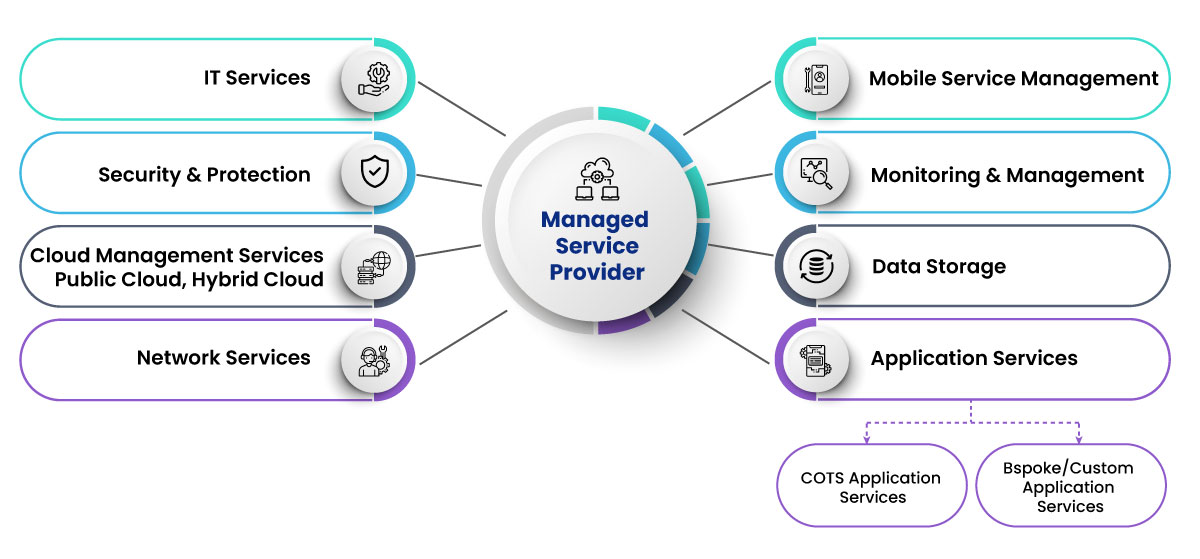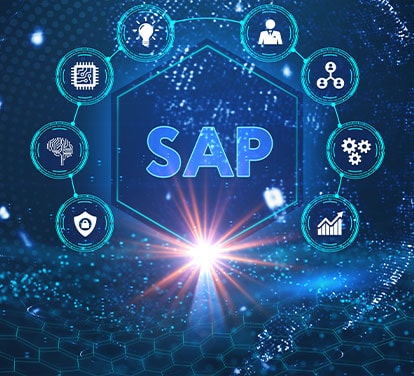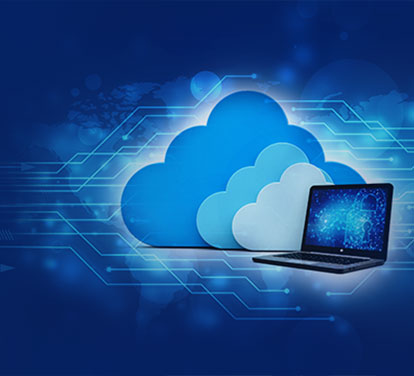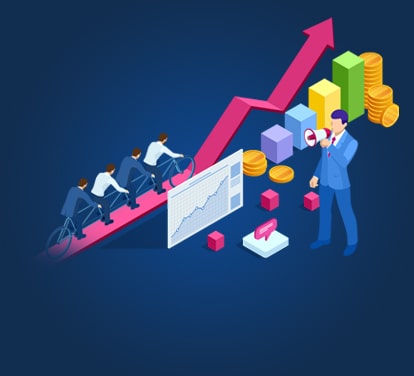It's no secret that as technology has rapidly evolved, managed services providers (MSPs) have become a vital part of companies' IT environments. But the question is: What will MSPs look like in the future?
“The need for operational resiliency across enterprise functions has never been greater. CIOs are striving to adapt to changing conditions to compose the future business. This requires the organizational plasticity to form and reform dynamically”, said Brian Burke, research vice president at Gartner in its IT Symposium/Xpo Americas 2020, last October.
In recent years, digital transformation is evident across all domains. Almost every industry is adopting the digital format to strengthen its hold in the market. The existing infrastructure and business models are being replaced by new ones, and businesses without digitalization are becoming obsolete. While we still grapple with the aftereffects of the pandemic, business resilience through digital initiatives is at the epicentre of all decision making.
An increasing number of businesses have successfully adopted the changes by way of embracing managed service providers, however, most organizations are struggling to do so. More than half of them have failed to catch up with the latest technologies and trends that are shaping the industry. Those who have succeeded to get ahead of this game must implement innovation in their IT departments.

While currently managed services are focused on reducing capital investments, IT executives also have hinted the possibility of using cloud, automation, and edge computing trends to make managed services more proactive in 2021. As a result, we will see more application outsourcing services, in fact more cloud application management services emerging to strengthen enterprises in the coming days. Organizations should adopt a digitization environment so that they can withstand exponential changes in their business sector and remain competitive.
We share an in-depth list of top managed services trends which will change the future of business.
Before that…
What Are Managed Services?
In the current scenario, MSPs have emerged as an alternative solution to traditionally IT application outsourcing services offered by many companies due to their perceived more efficient handling and overall performance. Their popularity has grown owing to the increasing businesses which rely on them for large-scale computing and other IT requirements. There is a huge range of managed services products on the market today, offering various layers of monitoring, integration, and automation. The range expands further with the advent of new MSPs emerging on the scene, offering new services not covered by previous offerings.
Why do you need an MSP (Managed Service Provider)?
Managed Service Providers or MSPs provide companies with a partner which uses People, Process, technology, and tools to provide services while reducing Total cost of ownership and improves operation efficiencies . This capability is becoming more prevalent due to growing recognition of the role that MSPs play in today’s marketplace. Managed Service Providers can be utilized for several reasons, some being cost reduction, speedier responses to issues affecting a business as well as enhancing tech support. Benefits of a managed service include reduced exposure to risks and costs associated with vendor selection and setup, simplified support processes as well as standardized responses to client queries to name a few.
The global managed IT services market is expected to reach $3 trillion by 2022 with a compound annual growth rate (CAGR) of nearly 9 percent.
For innovation:
Managed services broaden the horizon of innovation. They enable companies to take advantage of new technologies and solutions, especially if they are complex. They are thus a good alternative for companies that face the challenge of delivering strict quality standards but lack resources for extensive R&D. Managed services providers typically offer an innovative solution to business problems as a part of their core offering and value add. They focus on solving business challenges using technology as enabler, such as auto remediations of repetitive tasks using RPA and machine learning, create predictive solutioning framework by learning data patterns for the problems even before they occur.
For quicker-seamless-remote processes in the new normal:
In 2021, managed services providers are expected to offer more seamless solutions to their clients via virtual interfaces. More customers expect quick and effective responses to their questions regarding their service programs, under one roof. They also desire more flexible workflows that enable them to work remotely from anywhere in the world.
As more organizations move to remote work programs, there’s an increased need for managed services to help organizations transition from in-office offices to remote work environments. Future trends will rely heavily on automation to foster efficiency across processes and reduce employee time spent on administration tasks.
These requirements are naturally resulting in a shift in approach by managed services providers toward delivering services more effectively as part of a hybrid setup.
For security:
There has been an unprecedented increase in cyber security related incidents recently.
Top managed service providers help enterprises with protecting their data, faster. They not only offer complete cyber security solutions, but they also provide on-site services to assist businesses in improving their security posture, implementing new security controls, implementing mobile solutions and so on.
Managed service providers make sure that your data is kept safe, and the system they build can be managed by a third party, should things go wrong. It also means that in the event of an issue with the provider's service, it can be resolved rather than repetitive efforts being required by the customer to track down the issue with the provider, with all of its associated expenses.
The managed services market is now witnessing a transformation from a reactive approach to an active process driven by continuous innovation. A well-rounded, integrated managed services capability that addresses several key business outcomes is a competitive advantage.
Top Managed Services Trends which will Change the Future of Business
Artificial Intelligence Powered:
From simple technology like platform performance management to deeper strategic initiatives like cross-selling, managed services are increasingly reshaping the way an organization functions. Beyond simply handling routine tasks, managed services enable organizations to meet their strategic objectives by acting as a core agent for fulfilling client and strategy needs across multiple functional areas. It shifts the balance between inputs and outputs from traditional scripts to more efficient and effective systems that adapt to changing market conditions while simultaneously maximizing funding availability. AI is definitely at the forefront of these modernizations.
AI will be used at an increasing scale on a variety of platforms and industries. Increasingly, AI is being deployed to automate mundane tasks and create revolutionary new products and services.
With AI, companies can create performant models that reduce operational costs while increasing revenue potential. AI-based managed services are poised to disrupt the way your company does business and transform your industry.
Moreover, the MSP AIOps-led future for enterprises is not necessarily limited to seemingly mundane services. Artificial intelligence can be leveraged to offer highly personalized services, thus broadening the service offerings available to customers. Businesses can benefit from automating routine processes to offer services that are tailored to the customer’s needs.
IoT:
IoT and blockchain are becoming key technologies for building connected devices, systems, and services. These technologies enable a secure, robust, and efficient way of exchanging information between devices without the need for a central server. Companies have begun implementing IoT solutions to collect data and send it to the cloud in real-time. This allows businesses to act based on analytics instead of relying on manual processes such as field research or bring new services to market. The benefits of implementing IoT solutions in your business include increased efficiency, lower costs, and more accurate data collection.
MSPs are stepping up their game – with a particular focus on increasing customer awareness and adoption rates for IoT and blockchain-based services. Managed services providers (MSPs) find themselves in a strong position, as well as being key players in changing how we interact with the financial services industry. They can use the latest tech to help their customers manage any aspect of their financial lives efficiently and effectively.
Internet of Behaviours (IoB):
Workplaces are increasingly digital and data driven. This trend is especially true for big companies with lots of dependent relationships with customers, vendors, or employees. Out of an abundance of caution, big companies are recognizing that their most valuable assets are not just the goods and services they supply but also the relationships they build. IoB takes this notion a step ahead. IoB applications are emerging that provide an interface between organizations and their employees via the internet. The goal is to provide an ecosystem where employees feel comfortable partnering with one another and trusting their organizations' data without having any ability to access it directly.
The Internet of Behaviours (IoB) – evolved from the Internet of Things (IoT) – will become a key facet of the trend toward “people centricity” in the post-pandemic era as per Gartner.
In the coming years, we will witness growth in: - social networks that incorporate machine learning - mobile apps that utilize machine learning capabilities for user behaviour tracking and personalization - internet-based services that incorporate AI capabilities for customer segmentation and experience creation.
In new normal, managed IT services are working to incorporate these new technologies to for better services
Cloud Computing and Automation:
Cloud computing is swiftly becoming the de facto standard for businesses, allowing an organization to streamline its processes while drastically increasing the speed at which data is accessible and stored.
An uptick in the number of businesses using cloud computing as their method of data storage and processing has been observed. With the rising need for cloud computing services, there have also been issues with security and privacy. As more businesses make the move to using cloud computing services, it becomes important to understand what these services are and how you can switch over to benefit from the increased efficiency.
Top cloud managed service providers have created customized automation tools that empower business analysts, analysts, and developers to complete tasks automatically in a bid to increase efficiency and reduce human error. These cloud-based tools provide one-stop shop resources to help organizations automate core business functions with ease and efficiency.
Conclusion:
The world of managed services is growing rapidly. More and more companies are adopting MSP services to engage customers from a new angle and drive new leads and opportunities. There's a new breed of provider emerging who focuses more on enhancing an existing product or service and thereby helping a company grow bigger and stronger.
If there is one thing that the advanced technologies provide, it is agility. The ability of an organization to react quickly to changing requirements and requirements for software, networks, hardware, and staff is a primary characteristic that companies look for when selecting an IT managed service provider. Modern technologies also enable peer-to-peer networking between workers and the cloud infrastructure as well as the ability to manage large-scale environments, automate administration tasks and data centre operations with ease.
MSPs for Digital Transformation
MSPs will have an opportunity to leverage new technologies such as the digital transformation, data analytics, digital transformation equivalents (DTEs), and behavioural analytics—as well as existing capabilities—to deliver new services and enhanced functionality for their customers. As services deliverables such as blockchain, machine learning, or robotics have achieved mainstream adoption within organizations, organizations will seek ways to leverage new tech to remain competitive and respected in the marketplace. As such a powerful Partner leveraging Integrated Managed Services AIOps Platform offers the right combination of process knowledge, product expertise, technical skills, project management expertise, and flexible delivery models.













